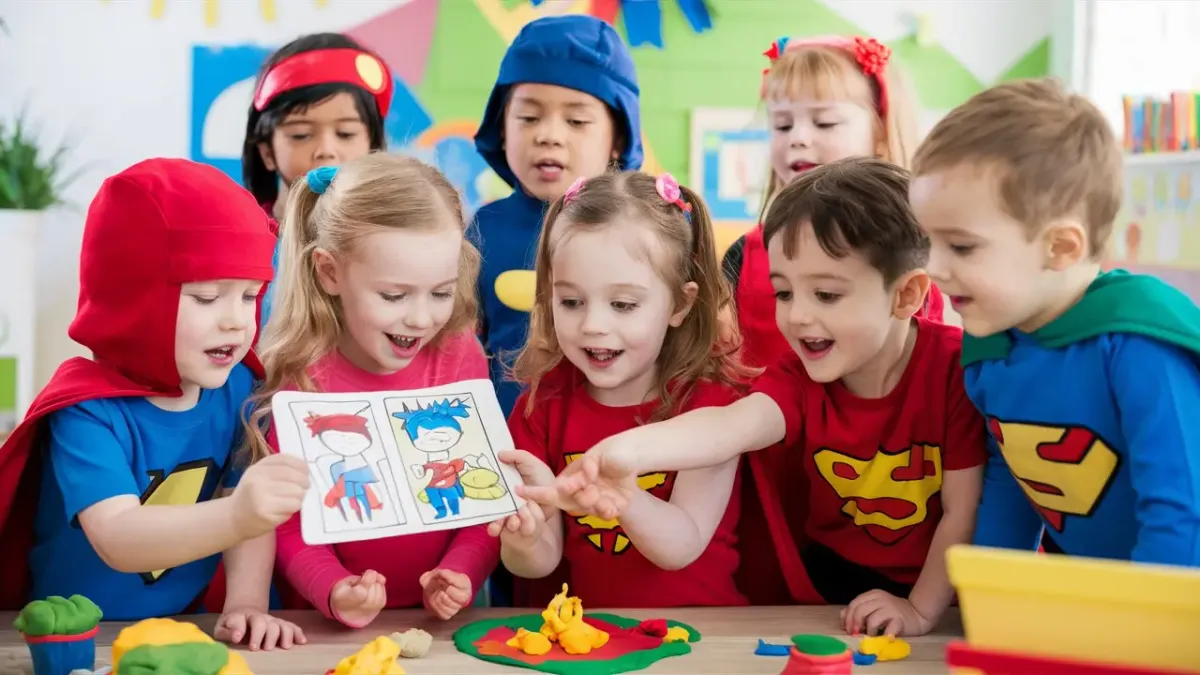How Daycare Supports Language Development in Young Children

As parents, one of the most exciting parts of watching your child grow is seeing them develop new skills—especially language skills. From their first words to full sentences, every step in language development is a milestone. While you, as a parent, are their primary caregiver and first teacher, daycare can play a crucial role in supporting and enhancing your child’s language development. In a daycare setting, children are exposed to a rich environment that promotes language learning in diverse and engaging ways.
In this blog, we’ll explore how daycare supports language development in young children, providing them with valuable opportunities to build strong communication skills that will serve them well throughout their lives.
1. Exposure to New Vocabulary
One of the key ways daycare supports language development is by exposing children to a wide range of vocabulary. In a daycare setting, children interact with peers and caregivers who use varied language in everyday situations.
- Rich Language Environment: Daycare staff are often trained to speak to children in a way that encourages language learning. Caregivers use descriptive language, ask open-ended questions, and introduce new words during daily routines (e.g., “Let’s go to the kitchen for snack time,” or “Can you help me find the red block?”).
- Peer Interaction: Children also learn from their peers, picking up new words and phrases through play and group activities. Listening to their friends and joining in conversations helps them understand how words and sentences are used in different contexts.
- Thematic Learning: Many daycares implement thematic learning programs, where children are exposed to words related to specific topics like animals, seasons, or emotions. These thematic units help expand a child’s vocabulary in a meaningful way.
2. Encouraging Social Communication
Language development is closely tied to social interaction, and daycare offers a rich environment for children to practice their communication skills with others.
- Conversations with Caregivers: Daycare providers engage with children in conversations throughout the day. Whether it’s asking about their favorite toys, talking about the weather, or discussing what’s happening around them, these interactions are invaluable in helping children learn how to communicate.
- Peer Interaction and Group Play: Children spend a significant amount of time interacting with other children their age. During free play or structured activities, they learn to share, negotiate, express emotions, and follow simple instructions. These interactions provide real-life practice in conversational skills.
- Role-Playing: Daycares often incorporate role-playing or pretend play in their daily routines. Whether it's playing "house," pretending to be animals, or mimicking familiar social situations, pretend play gives children the chance to practice using language in different scenarios, enhancing their communication abilities.
3. Exposure to Stories and Reading
Daycare is an ideal place for children to develop a love for books and stories, which are essential for fostering language development.
- Reading Aloud: Caregivers often read to children throughout the day, using picture books, storybooks, and other reading materials. This introduces children to sentence structure, new words, and the rhythm of language. Listening to stories also promotes comprehension, helping children connect words with meanings and images.
- Interactive Reading: Daycares often use interactive reading techniques to engage children during storytime. Asking questions like “What do you think will happen next?” or “How does that character feel?” encourages children to think critically about language and develop their vocabulary.
- Storytelling and Rhymes: Rhyming games, songs, and finger plays help children learn the sounds and rhythm of language. This not only makes learning fun but also promotes phonemic awareness—the understanding of sounds that is crucial for reading development.
4. Developing Listening Skills
Listening is an essential part of language development, and daycare provides numerous opportunities for children to strengthen their listening skills.
- Group Instructions and Activities: In daycare, children are often asked to listen to group instructions for activities such as circle time, arts and crafts, or games. This helps them develop the ability to follow directions and understand spoken language.
- Listening to Peers: During playtime, children learn to listen to their peers. Whether they’re playing a game, sharing toys, or working together on a project, they practice listening carefully to others’ thoughts, ideas, and emotions.
- Songs and Music: Many daycare programs incorporate songs and music into their daily routines. Listening to music helps children develop their auditory discrimination skills, which are key to learning the sounds and rhythms of language.
5. Building Confidence in Speaking
Daycare offers a safe, supportive environment where children can practice speaking without fear of judgment. The social setting gives them the confidence to experiment with new words and phrases in front of both adults and peers.
- Positive Reinforcement: Caregivers praise and encourage children when they use new words, form sentences, or participate in group discussions. Positive reinforcement boosts a child’s confidence, making them more likely to continue practicing their language skills.
- Opportunities for Expression: Daycare provides numerous opportunities for children to express themselves. Whether it’s through art, music, or storytelling, children can use language to express their thoughts, ideas, and feelings. These activities help build their confidence in verbal communication.
6. Supporting Bilingual Language Development (If Applicable)
In multicultural and multilingual daycare settings, children may be exposed to more than one language. This can significantly benefit their cognitive and linguistic development.
- Bilingual Exposure: Children in bilingual daycares are often exposed to both languages during their daily activities. They might hear songs, stories, and instructions in two languages, which helps them develop a broader understanding of language.
- Cognitive Benefits: Research shows that learning multiple languages enhances cognitive skills, such as memory, problem-solving, and creativity. Bilingual children are also better at switching between tasks and adapting to new situations.
7. Incorporating Technology (Mindfully)
While face-to-face interaction remains the most important way to support language development, some daycares incorporate educational technology that encourages language learning in creative ways.
- Language Apps and Games: In some daycare settings, caregivers may use age-appropriate educational apps that help reinforce language skills. These apps can support vocabulary building, letter recognition, and simple sentence formation.
- Interactive Screens: Some daycare centers use interactive screens (such as smartboards or tablets) to engage children in language activities, like following along with digital storybooks or singing along to educational songs.
8. Building Emotional Language
Daycare also plays a role in helping children learn the language to express their emotions, which is a critical aspect of social and emotional development.
- Labeling Emotions: Caregivers help children identify and label their emotions by saying things like, “You look sad,” or “Are you feeling frustrated?” This helps children develop emotional intelligence and gives them the words they need to express their feelings appropriately.
- Problem-Solving Language: When conflicts arise among children, daycare caregivers guide them in using language to solve problems. This helps children learn how to express their needs, negotiate with peers, and resolve conflicts using words instead of actions.
Conclusion
Daycare is more than just a place where your child plays while you're at work—it’s a dynamic environment that significantly contributes to their language development. Through a combination of social interactions, exposure to new vocabulary, reading, storytelling, and even technology, daycare provides a rich, supportive space where children can grow their language skills. These early experiences lay the foundation for future communication abilities, setting your child on a path to success in school and beyond.
As you prepare for daycare, know that your child’s language development will be nurtured every day in a fun, supportive, and enriching environment. With the right balance of structured learning and play, daycare can play an invaluable role in helping your child become a confident, articulate communicator.




